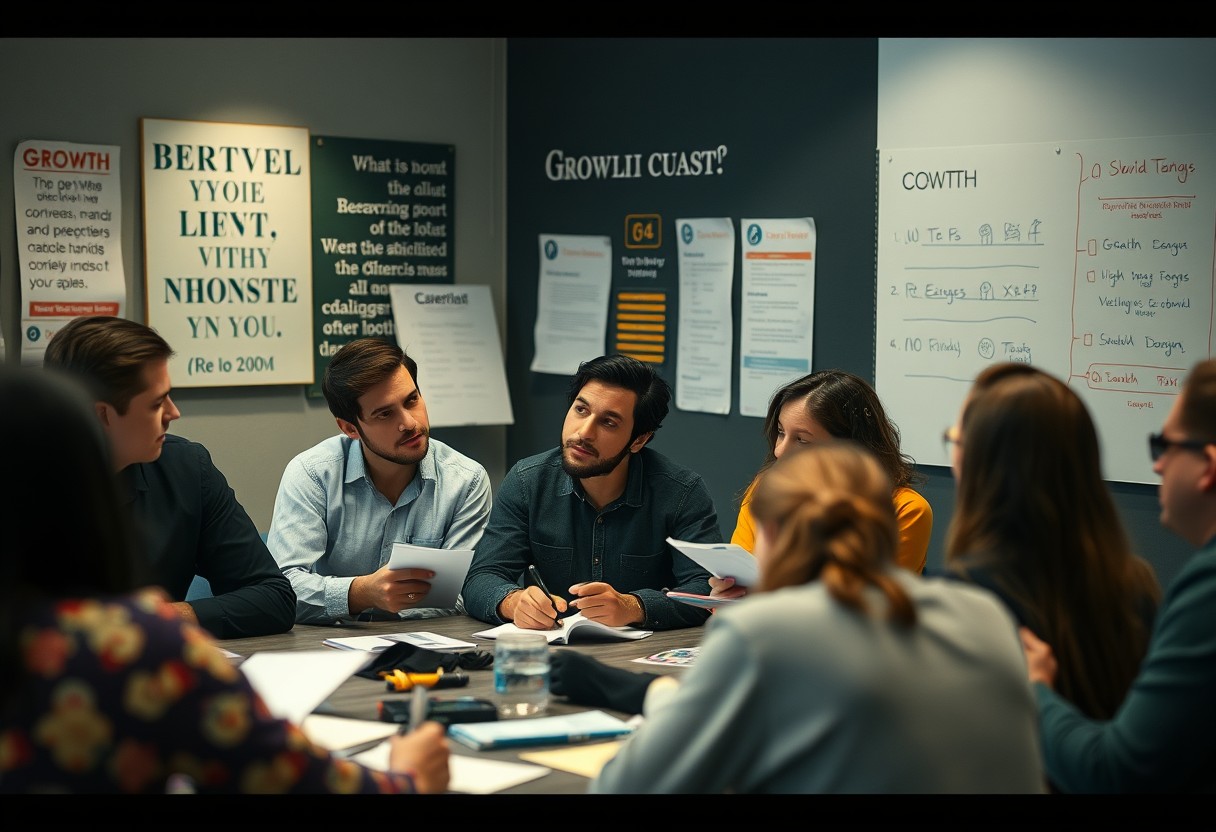Inspiration is the key to unlocking your potential and initiateing on a transformative journey of personal development and growth. You possess the ability to evolve and enhance various aspects of your life, from your mindset to your skills. This guide provides you with powerful motivational tips that will empower you to take actionable steps, fostering a positive environment for self-improvement. Whether you’re looking to boost your confidence, learn new skills, or embrace change, these strategies will guide you in cultivating a fulfilling life that resonates with your aspirations.

Understanding Personal Development
For those launching on a journey of self-improvement, understanding personal development is the first step. It involves the continuous process of evaluating and enhancing your skills, values, and potential. This journey allows you to gain greater self-awareness, set meaningful goals, and strive for a fulfilling life. By prioritizing personal development, you can cultivate the mindset needed for lasting success and enriched experiences.
Defining Personal Development
If you find yourself questioning what personal development truly means, know that it encompasses various aspects of your life, including emotional, intellectual, and social growth. It’s about taking directed steps to improve yourself, fostering a mindset open to change, and being proactive in shaping your future. Your personal development journey is unique to you, reflecting your ambitions and values.
The Importance of Personal Growth
Any journey of personal growth you undertake will significantly impact your overall happiness and success. It equips you with the skills to navigate life’s challenges and enhances your ability to connect meaningfully with others. As you explore new ideas and perspectives, your confidence will grow, allowing you to step outside your comfort zone and embrace new opportunities.
With a strong focus on personal growth, you empower yourself to pursue goals that align with your true self. The ability to adapt, learn, and strive for improvement creates a fulfilling sense of purpose in your life. As you invest in your development, you’ll find that the benefits extend beyond your personal aspirations; it can transform your relationships, career, and overall outlook. Embracing a growth mindset invites a wealth of possibilities and strengthens your resolve to face obstacles with resilience.
How-to Set Realistic Goals
There’s an art to setting realistic goals that align with your personal development journey. Begin by defining what success looks like for you and ensure your objectives are specific, measurable, achievable, relevant, and time-bound. By following these guidelines, you’ll create a clear roadmap that makes it easier to track your progress and stay motivated.
SMART Goals Explained
While creating goals, consider adopting the SMART criteria: Specific, Measurable, Achievable, Relevant, and Time-bound. This framework helps you clarify your intentions and set realistic benchmarks, enabling you to assess your progress effectively. By making your goals SMART, you ensure they resonate with what you truly want to achieve.
Techniques for Effective Goal-Setting
To set effective goals, start with the big picture and break it down into smaller, manageable steps. Prioritize your objectives and outline actionable tasks that lead you toward your desired outcome. Additionally, review your goals regularly, allowing room for adjustments as your priorities change.
Another technique for enhancing your goal-setting is to visualize your success. Picture yourself achieving your goals, which can serve as a powerful motivator. Also, consider sharing your goals with someone who can offer support and accountability. This collaborative approach creates a sense of commitment and can encourage you to stay on track, fostering both personal growth and development.
Tips for Building a Growth Mindset
One of the most transformative steps you can take in your personal development journey is cultivating a growth mindset. This mindset allows you to embrace challenges and view failures as opportunities for learning. Here are some tips to get you started:
- Embrace challenges as learning opportunities.
- Recognize that effort leads to improvement.
- See feedback as a valuable tool for growth.
- Surround yourself with growth-minded individuals.
Knowing how to shift your perspective can significantly impact your personal progress.
Recognizing Fixed vs. Growth Mindset
Any effective journey toward personal development begins with understanding the difference between a fixed and a growth mindset. A fixed mindset believes talents and abilities are static, while a growth mindset sees them as qualities that can be developed through dedication and hard work. Recognizing these characteristics in yourself is the first step toward fostering a more adaptive and resilient approach to challenges.
Strategies to Foster a Growth Mindset
Strategies to foster a growth mindset involve intentional practices that encourage you to view setbacks as stepping stones. It’s imperative to keep an adaptive mindset and seek continuous learning opportunities. Utilizing positive self-talk, setting realistic goals, and reflecting on your experiences can all contribute to a growth-oriented perspective.
Building a growth mindset requires consistent effort and openness to change. Rather than shying away from challenges, lean into them as a chance to expand your skills. Continuous learning should be at the forefront of your daily endeavors, whether through formal education or self-directed pursuits. Celebrate your progress, seek constructive feedback, and maintain a belief in your ability to improve; these will help solidify a growth mindset over time.
Key Factors Influencing Personal Development
Keep in mind the key factors influencing your personal development which include:
- Your mindset and attitudes
- Support from peers and mentors
- Opportunities for learning and growth
- Life experiences and challenges
Recognizing these influences can empower you to create a more fulfilling path toward growth.
External Influences and Support Systems
Personal development is significantly shaped by external influences and support systems in your life. Surrounding yourself with positive and encouraging individuals can enhance your motivation. Friends, family, and mentors who believe in you play a vital role in pushing you toward your goals, offering guidance when needed. Engaging with communities and groups that share your interests can also provide invaluable insights and inspiration.
Internal Motivation and Self-Discipline
The drive to pursue your personal development ultimately comes from within, fueled by your internal motivation and self-discipline. It is vital to identify your goals and the reasons behind them, as this awareness guides your actions. Building a routine that prioritizes your development fosters discipline, making it easier to navigate challenges and setbacks.
Another aspect of cultivating self-discipline is establishing accountability to yourself. Setting specific, achievable goals can help you monitor your progress and celebrate small victories along the way. As you develop a practice of self-reflection, you’ll also begin to understand what truly motivates you and what obstacles you need to overcome, paving the way for lasting growth and improvement.
How to Overcome Obstacles in Personal Growth
Your journey towards personal growth is inevitably accompanied by obstacles that can hinder your progress. Embracing these challenges is important, as they offer valuable lessons and opportunities to develop resilience. By identifying barriers and devising actionable strategies, you can navigate these hurdles and propel your personal development forward.
Identifying Common Barriers
Obstacles to personal growth can manifest in various forms, such as fear of failure, lack of self-discipline, or external pressures from your environment. It’s important to take the time to recognize these barriers in your life, as understanding their presence allows you to effectively address and overcome them, paving the way for meaningful growth.
Practical Solutions and Coping Strategies
Assuming that obstacles will simply disappear will only hinder your progress. Instead, start by establishing clear, achievable goals that break larger aspirations into manageable steps. Utilize positive affirmations and visualization techniques to cultivate a forward-thinking mindset. Additionally, surround yourself with supportive individuals who can provide encouragement and constructive feedback as you navigate your personal development journey.
Common strategies for overcoming obstacles include developing a structured plan that outlines your goals, revisiting them regularly to track progress, and adjusting as necessary. Engaging in mindfulness practices can help you stay present and focused, while journaling can serve as a powerful tool to reflect on your growth and challenges. Don’t hesitate to seek professional support if needed, as a coach or therapist can offer insights tailored to your unique situation.
Tips for Continuous Learning and Improvement
Now, it’s vital to adopt a mindset geared towards continuous learning and improvement. Focus on these strategies:
- Set specific learning goals.
- Seek feedback and use it constructively.
- Embrace challenges as opportunities for growth.
- Engage with others who inspire you.
Thou commit to the journey of growth and learning.
Resources for Personal Development
Continuous exploration of resources can significantly enhance your personal development journey. Utilize books, online courses, podcasts, and workshops to expand your knowledge and skills. Connect with mentors who can provide insights and guidance tailored to your goals.
Building a Habit of Lifelong Learning
An effective way to ensure you’re always growing is to build a habit of lifelong learning. Make it a part of your daily routine by dedicating time to read, take online classes, or engage in discussions with knowledgeable individuals.
Habit formation is about consistency and making learning a priority in your life. Start small by dedicating just 15 minutes a day to a new topic or skill. Gradually increase this time as you discover more areas of interest. Embracing lifelong learning will keep you engaged and adaptable in an ever-changing world.
Final Words
Conclusively, embracing personal development and growth requires a commitment to self-awareness, goal-setting, and continuous learning. By incorporating small, actionable steps into your daily routine, you empower yourself to make meaningful changes. Surround yourself with supportive individuals, seek feedback, and maintain a positive mindset to foster resilience. Ultimately, your journey towards personal growth is unique; embrace it fully and celebrate every milestone along the way to unlock your true potential.

